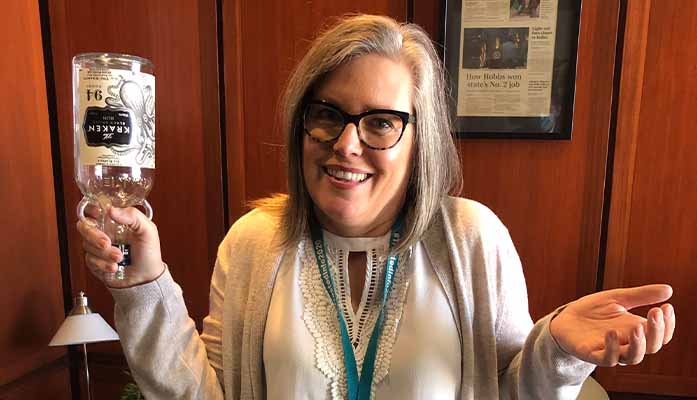
by Staff Reporter | Feb 26, 2025 | Education, News
By Staff Reporter |
A majority of the Arizona State Board of Education (ASBE) members are serving on expired terms. Governor Katie Hobbs’ office has yet to replace them, but now she’s targeting one member in particular with an historically strong advocacy for school choice.
Board members serve a four-year term under gubernatorial appointment with State Senate consent.
Six of the 11 members on the board are serving on expired terms. The board also has one vacancy, making it six of 10 existing members to be serving on expired terms.
The terms for Jason Catanese and Vice President Dr. Scott Hagerman expired last January. The terms for President Katherine Haley, Jenny Clark, Dr. Daniel Corr, and Julia Meyerson expired last month.
It appears that Clark and her expired term came on Hobbs’ radar with the signing of the Phoenix Declaration: An American Vision for Education from the conservative think tank, Heritage Foundation, last week during its Conservative Vision of Education Conference in Phoenix. The declaration advocates for school choice, curriculum transparency, ideology-free classrooms, Western and Judeo-Christian education, character-based learning models, merit-based academic standards, and a greater emphasis on civics education.
10 educational and public interest groups, along with over 50 scholars and education policy experts, signed onto the declaration. Clark signed on with the organization she founded, Love Your School.
Following this development, Hobbs’ office called on Clark to resign last Wednesday. When Clark refused, Hobbs’ staff allegedly advised of a letter to arrive last Friday confirming Clark’s term ending. Clark claimed she had received no such letter as of Monday.
“Honestly, I’m surprised @GovernorHobbs didn’t remove me when she took office (which was fully within her abilities as Governor). Clearly, the 9th floor has been struggling the last couple of years!” said Clark. “I’ve enjoyed advocating for all students (including Arizona ESA families) while on the board, and I know the current board has a significant task ahead with the absolute CRISIS in math and reading AZ public schools are facing with the latest NAEP scores. I look forward to seeing the timely, aggressive, and student-centered approach they will take regarding this crisis.”
One of Hobbs’ main campaign promises was to eradicate the universality of the school choice program implemented by her predecessor, Republican Doug Ducey, in 2022.
Over the course of her two-year-long fight with the Republican-controlled legislature, Hobbs scaled back her original goal of undoing the universality of the state’s school choice model.
This year, Hobbs is vying for a budget proposal slashing funds to the states Empowerment Scholarship Accounts (ESA) Program. Hobbs proposed graduated income limits, with a restriction to household incomes at or above $200,000.
House Speaker Steve Montenegro indicated in statements to the press that this budget was a nonstarter for Republicans.
“While we share a commitment to improving the lives of Arizonans, the Governor’s budget proposal as presented raises concerns about parental choice, fiscal responsibility, public safety, economic growth, and the undue burdens it places on the backs of taxpayers,” said Montenegro.
Nearly 86,500 students have entered the ESA Program as of Monday.
AZ Free News is your #1 source for Arizona news and politics. You can send us news tips using this link.

by Matthew Holloway | Feb 25, 2025 | Economy, News
By Matthew Holloway |
Arizona State Rep. Jeff Weninger (R-LD13) has targeted the hidden fees—also known as interchange fees—which are imposed by credit card companies every time a card is used for payment. These fees are charged on every transaction and can range from 1% to 5%. The lawmaker is calling for these fees, which are charged on transaction totals, including taxes, to be reformed to include only pre-tax totals.
Weninger penned an op-ed with the straightforward message that “It’s time to wipe the swipe on taxes.” He called upon members of the Arizona House of Representatives to support HB2629, legislation he has sponsored to force credit card companies to eliminate swipe fees on sales taxes.
He wrote in part, “The credit card industry is dominated by two major players—Visa and Mastercard—who control 90% of payment processing transactions outside of China. These companies are raking in record profits, while Arizona businesses are left footing the bill for an unfair, hidden charge.
“HB2629 will stop this practice and ensure Arizona businesses and consumers are treated fairly. By eliminating swipe fees on sales taxes, we can keep more money in our state’s economy, help small businesses grow, and prevent credit card companies from profiting off of money that should go back to our communities.”
The National Federation of Independent Business (NFIB) announced its support for the bill with NFIB State Director Chad Heinrich explaining in a statement, “HB 2629 will protect small businesses and keep more resources in Arizona for Arizonans. Today, millions of dollars, which could be better spent in Arizona on higher employee wages, better benefits, and business expansion, are instead being sent to out-of-state banks and major credit card companies that profit off Arizona state and local taxes.”
As noted in Weninger’s op-ed, Arizona businesses and consumers combined paid out over $217 million in interchange fees in 2023. According to Weninger, it’s “a fee on a fee that never should have existed in the first place.”
Matthew Holloway is a senior reporter for AZ Free News. Follow him on X for his latest stories, or email tips to Matthew@azfreenews.com.

by Daniel Stefanski | Feb 25, 2025 | News
By Daniel Stefanksi |
A bill to support the efforts of law enforcement on the streets of Arizona is progressing through the state legislature.
Last week, HB 2733 was approved by the Arizona House of Representatives Public Safety & Law Enforcement Committee. The bill, which was sponsored by State Representative David Marshall, “protects law enforcement officers from civil liability when taking down unmanned aircraft suspected of being used for criminal activities within 15 miles of the international border.”
In a statement released in conjunction with the bill’s progress, Representative Marshall said, “Arizona’s law enforcement officers are on the front lines of the fight against cartels and traffickers exploiting our border, and they need the ability to act decisively against criminal drone activity. These drones aren’t toys – they’re tools of organized crime, used to scout for weak points in our security and to smuggle fentanyl and other deadly drugs into our communities. HB 2733 makes sure that our officers can neutralize these threats without the fear of frivolous lawsuits.”
Marshall added, “This bill is a no-brainer. Law enforcement shouldn’t have to second-guess their ability to stop cartel drones from carrying drugs across the border. Our Majority is standing firm on securing Arizona, backing law enforcement, and taking action to keep dangerous criminals out of our communities.”
According to the press release issued by the Arizona House Republicans on the bill, “The rise in cartel drone activity has put additional pressure on Arizona’s law enforcement agencies, forcing officers to make quick decisions in real-time to prevent smuggling operations.” The proposal would give these law enforcement officials “the legal certainty they need to act without hesitation, protecting Arizona’s communities from the devastating consequences of cartel operations.”
The bill was passed by the House committee with a bipartisan vote of 10-0, though three members were absent and two voted ‘Present.’
On the Arizona Legislature’s Request to Speak system, representatives from the Arizona Attorney General’s Office and the Arizona Association of Chiefs of Police signed in to support the bill, while a representative of the American Civil Liberties Union of Arizona indicated the organization’s opposition to the legislation. A representative from the Arizona Trial Lawyers Association signed in as neutral.
HB 2733 will now be considered by the full state House of Representatives in the near future.
Daniel Stefanski is a reporter for AZ Free News. You can send him news tips using this link.

by Daniel Stefanski | Feb 25, 2025 | News
By Daniel Stefanski |
One Arizona lawmaker is making a push for greater state sovereignty.
Last week, State Representative Lisa Fink, a Republican, wrote an op-ed, entitled, “Make Arizona Sovereign Again.” In this piece, the first-term legislator makes the case for three of her bills that “push back against federal overreach and empower our citizens to take back control of their lives by restoring transparency in our elections, unleashing economic prosperity with our natural resources, and safeguarding the health and safety of Arizonans, putting the people and economy of our state first.”
The first bill Fink highlights is HB 2059, which would “ensure Arizona and employees of its state agencies are no longer forced to uphold various federal regulations on critical natural resource industries, like mining, coal, oil, and gas, that violate the clear boundaries of the U.S. Constitution. Representative Fink states that Arizona “must have the freedom to prioritize its own economic prosperity and environmental stewardship without being bound by harmful federal mandates.”
The second bill the state lawmaker presents is HB 2060, which would “strictly adher[e] to established laws on voter registration, citizenship, residency, and proof of identification. Fink opined that “securing our polls, free from outside interference, is of the utmost importance to preserving trust in our processes.”
The final bill that Representative Fink addressed was HB 2056, which would “take a proactive stance against federal efforts to alter the environment, protecting our state’s autonomy.” The Republican legislator states that she introduced this legislation because of the “growing issue of environmental manipulation, specifically addressing concerns over weather modification techniques like geoengineering and solar radiation management perpetrated by the federal government and multinational organizations. Fink added that “Arizona’s environment and natural resources belong to the people of this state – not federal agencies and certainly not the global elite.”
As she ended her piece, Representative Fink wrote, “The message is clear: Arizona will not tolerate unconstitutional federal overreach. From energy independence and mineral dominance to election integrity to defending our environment, this series of bills reasserts Arizona’s Tenth Amendment rights over the federal government and puts Arizona first. This is about reclaiming the freedom that is rightfully ours.”
Daniel Stefanski is a reporter for AZ Free News. You can send him news tips using this link.

by Staff Reporter | Feb 24, 2025 | Economy, News
By Staff Reporter |
The Phoenix-based Nikola Corporation filed for bankruptcy this week — Arizona gave millions in incentives and tax credits to the company over the past five years.
Nikola develops electric- and hydrogen-powered vehicles. The company’s bankruptcy comes after years of federal investigations for fraud concerning the company’s innovation and development claims.
In 2019, Nikola received $1.3 million in pre-approved incentives based on projections. That year, projected new jobs were estimated at 400 and the average wage of projected new jobs was estimated at $80,500. The Arizona Commerce Authority (ACA) earned Project of the Year by the Area Development Magazine for bringing on the company.
In 2020, ACA awarded Nikola the highest single pre-approved A-1 incentives grant out of seven awardees for the Arizona Competes Fund Program: $3.5 million. That year, ACA projected Nikola capital investment to be at around $1 billion. Projected new jobs were estimated at over 2,000, with the average wage of projected new jobs at $65,000.
That was the year Nikola had an estimated value of $30 billion.
ACA also gave Nikola a pre-approval for a $7.1 million tax credit. In 2021, ACA then post-approved Nikola for a $6 million tax credit as part of the Qualified Facility Incentive Program. Nikola was one of 19 businesses to receive the award that year.
The company paid $125 million in a settlement to the Securities and Exchange Commission (SEC) that year, though Nikola didn’t claim wrongdoing.
In 2023, ACA pre-approved Nikola for a $3.74 million tax credit as part of the Qualified Facility Incentive Program. Nikola was one of 24 businesses to receive the award that year.
That year, Nikola founder Trevor Milton was convicted of fraud and sentenced to four years in prison for making false and misleading claims to encourage investor demand. Despite resigning from the company in 2020 and the federal investigations into Milton, ACA continued to give millions in financial incentives to Nikola.
The Department of Justice (DOJ) in its announcement of Milton’s sentencing described Nikola’s promise as a mirage:
“Milton made false claims regarding nearly all aspects of Nikola’s business, including: (i) false and misleading statements that the company had early success in creating a ‘fully functioning’ semi-truck prototype known as the ‘Nikola One,’ when MILTON knew the prototype was inoperable; (ii) false and misleading statements that Nikola had engineered and built an electric- and hydrogen-powered pickup truck known as ‘the Badger’ from the ‘ground up’ using Nikola’s parts and technology, when MILTON knew that was not true; (iii) false and misleading statements that Nikola was producing hydrogen and was doing so at a reduced cost, when MILTON knew that in fact no hydrogen was being produced at all by Nikola, at any cost; and (iv) false and misleading claims that reservations made for the future delivery of Nikola’s semi-trucks were binding orders representing billions in revenue, when the vast majority of those orders could be cancelled at any time.”
AZ Free News is your #1 source for Arizona news and politics. You can send us news tips using this link.

by Daniel Stefanski | Feb 24, 2025 | Education, News
By Daniel Stefanski |
The Arizona Legislature is taking a stand against antisemitism.
Last, the Arizona House Education Committee approved HB 2867, the Antisemitism in Education Act, which would “prohibit Arizona’s public schools and state agencies from promoting antisemitic conduct or rhetoric and establish strict penalties for violations.” HB 2867 was sponsored by State Representative Michael Way.
The legislation was approved with a bipartisan vote of 8-4. One Democrat joined seven Republicans to support the bill.
According to information shared by the Arizona House Republicans, the proposal would “enforce clear prohibitions on using taxpayer dollars to fund antisemitic curricula or activities, ensure accountability for individuals and institutions that violate these protections, and empower students, parents, and educators to report violations.” The bill additionally “aligns with the internationally recognized IHRA Working Definition of Antisemitism, which the U.S. State Department has adopted as the standard for identifying and addressing antisemitic conduct.”
In a statement that accompanied the announcement of the bill’s progress, Representative Way said, “Our schools should be places of learning, not breeding grounds for hatred and discrimination. Arizona has zero tolerance for antisemitism, and this bill ensures that our classrooms are free from the toxic ideology that fuels division and hostility. No teacher, administrator, or student should be forced to endorse or participate in any form of antisemitic conduct. This legislation sends a clear message – there will be consequences for those who violate these fundamental principles.”
Way added, “House Republicans are leading with action, not lip service. We’re committed to protecting students and teachers from the kind of coercion and discrimination that have no place in Arizona’s classrooms. We will uphold American values – freedom, fairness, and safety. I’m proud to see this bill advance and look forward to its passage in the full House.”
On the Arizona Legislature’s Request to Speak system, representatives from the Arizona Education Association, American Civil Liberties Union of Arizona, Save Our Schools Arizona, Arizona National Organization for Women (NOW), and CHISPA ARIZONA – A Program of League of Conservation Voters, signed in to oppose the bill.
HB 2867 will now be considered by the full Arizona House of Representatives in the near future.
Daniel Stefanski is a reporter for AZ Free News. You can send him news tips using this link.






